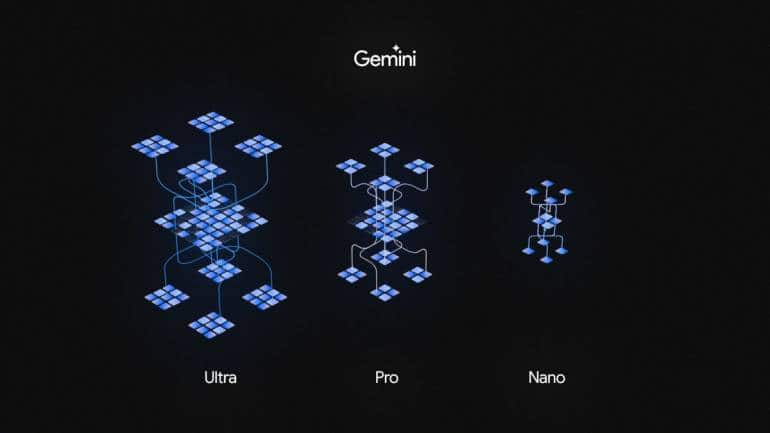The most potent AI model to date, called Gemini, was just revealed by Alphabet, the parent company of Google. With this innovative advancement, Alphabet is taking a bold step towards competing in the highly competitive artificial intelligence space, where it will face off against competitors like OpenAI’s GPT-4 and Meta’s Llama 2.

Credits: Money Control
Gemini: A Multimodal Marvel:
Being the first AI model of its kind created by Alphabet following the merging of its AI research divisions, DeepMind and Google Brain, Gemini stands out as a significant turning point in the development of AI models. DeepMind CEO Demis Hassabis is leading this collaborative initiative, which is now called Google DeepMind.
Gemini’s “multimodal” nature—which enables it to concurrently understand and process multiple kinds of information—is one of its primary characteristics. It can operate with text, code, images, audio, and video with ease. Gemini’s adaptability makes it a dynamic tool that can handle a variety of jobs.
Three Sizes, Multiple Applications:
Gemini comes in three different sizes to cater to varying complexities of tasks. The Ultra version is designed for highly complex operations, the Pro version for scaling across a broad spectrum of tasks, and the Nano version for on-device tasks.
Developers will have access to Gemini Pro through the Gemini API in Google AI Studio and Google Cloud Vertex AI starting December 13. Gemini Nano, tailored for Android developers, will utilize AICore, a new system capability introduced in Android 14. This capability will be available on Pixel 8 Pro devices starting December 6, with plans to extend support to other Android devices in the future.
Integration into Google Products:
Alphabet plans to integrate Gemini across its entire product ecosystem. The Bard, a feature used in various Google products, will utilize a fine-tuned version of Gemini Pro for advanced reasoning, planning, and understanding. Furthermore, Gemini Nano will power new features on Pixel 8 Pro smartphones, enhancing applications like the ‘Summarise’ feature in the Recorder app and Smart Reply in Gboard.
Beyond individual product enhancements, Gemini is set to play a pivotal role in improving the speed and efficiency of Google’s generative AI search offering, the Search Generative Experience (SGE).
Performance Superiority and Applications:
Gemini Ultra boasts impressive performance, surpassing current state-of-the-art results on 30 out of 32 widely-used academic benchmarks in large language model (LLM) research and development. It is the first model to outperform human experts on the massive multitask language understanding (MMLU) benchmark.
Gemini Pro has also demonstrated superiority over its predecessor, GPT-3.5, in six out of eight benchmarks, showcasing its advanced capabilities in tasks such as MMLU and Grade School Math 8K.
The applications of Gemini extend to various domains, from understanding complex written and visual information to extracting insights from documents. It excels in nuanced information comprehension and can answer questions on intricate subjects like math and physics. Additionally, Gemini can understand, explain, and generate high-quality code in popular programming languages.

Credits: Money Control
Alphabet’s Vision and Impact:
Alphabet CEO Sundar Pichai emphasizes that the current transition in AI is more profound than previous shifts to mobile or the web. He sees AI as a catalyst for scientific discovery, accelerated human progress, and improved lives. Pichai anticipates AI’s potential to create unprecedented opportunities, innovation, economic progress, and knowledge enhancement.
The introduction of Gemini aligns with Alphabet’s broader vision, representing a monumental science and engineering effort for the company. The flexibility of Gemini, running efficiently across data centers and mobile devices, is expected to significantly enhance how developers and enterprises build and scale AI solutions.
Competition in the AI Space:
Alphabet’s unveiling of Gemini comes amid a competitive landscape where major players like Microsoft-backed OpenAI have recently released their advanced AI models. OpenAI’s GPT-4 Turbo, an improved version of its flagship GPT-4 model, is one such competitor. The race to lead the AI space is characterized by continuous innovation and the pursuit of more powerful and capable models.
Conclusion:
With the release of Gemini, Alphabet has made a major advancement in artificial intelligence. Alphabet’s dedication to developing AI capabilities is further demonstrated by the release of a multimodal model that performs better and has a wide range of applications. Gemini is expected to have a significant impact on a variety of businesses as well as the larger AI environment as it integrates more and more into Google’s offerings. As the competition for supremacy in AI intensifies, Alphabet is putting itself at the forefront of this game-changing innovation.












